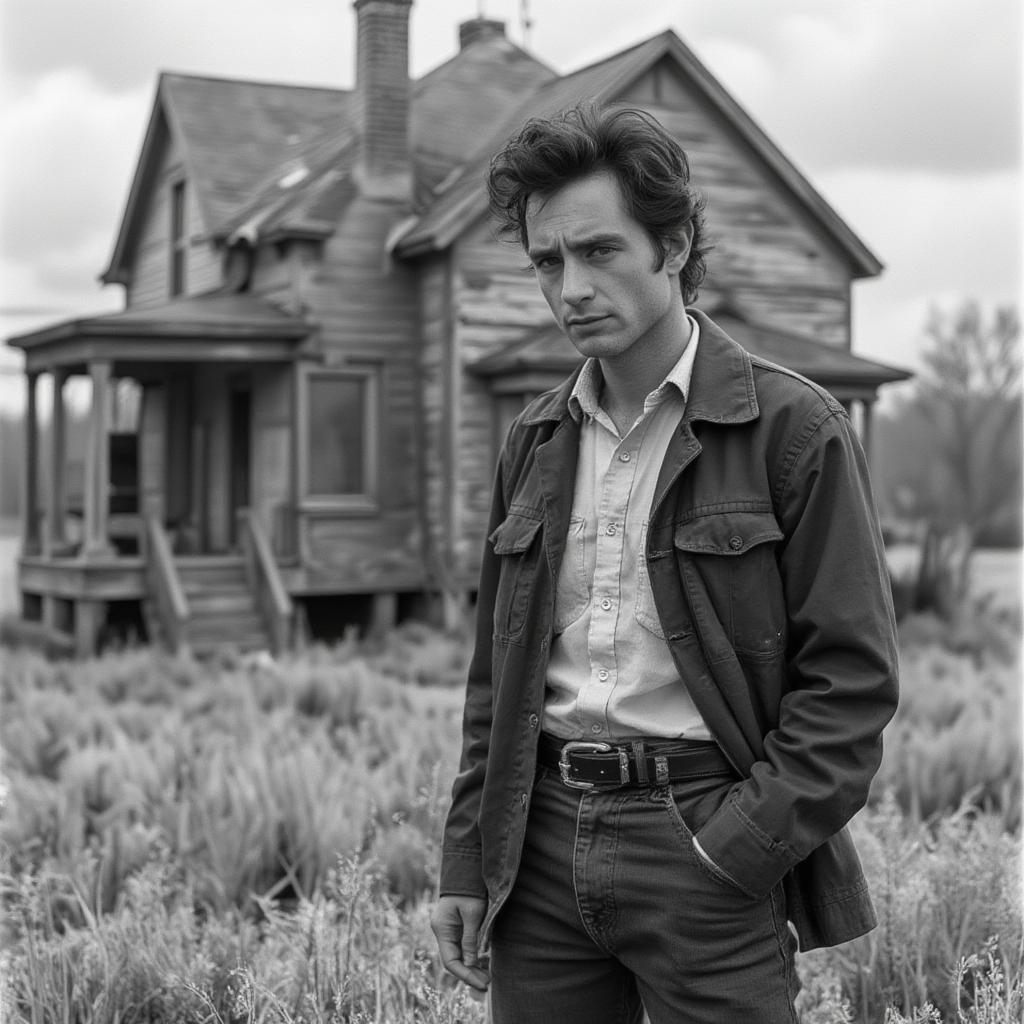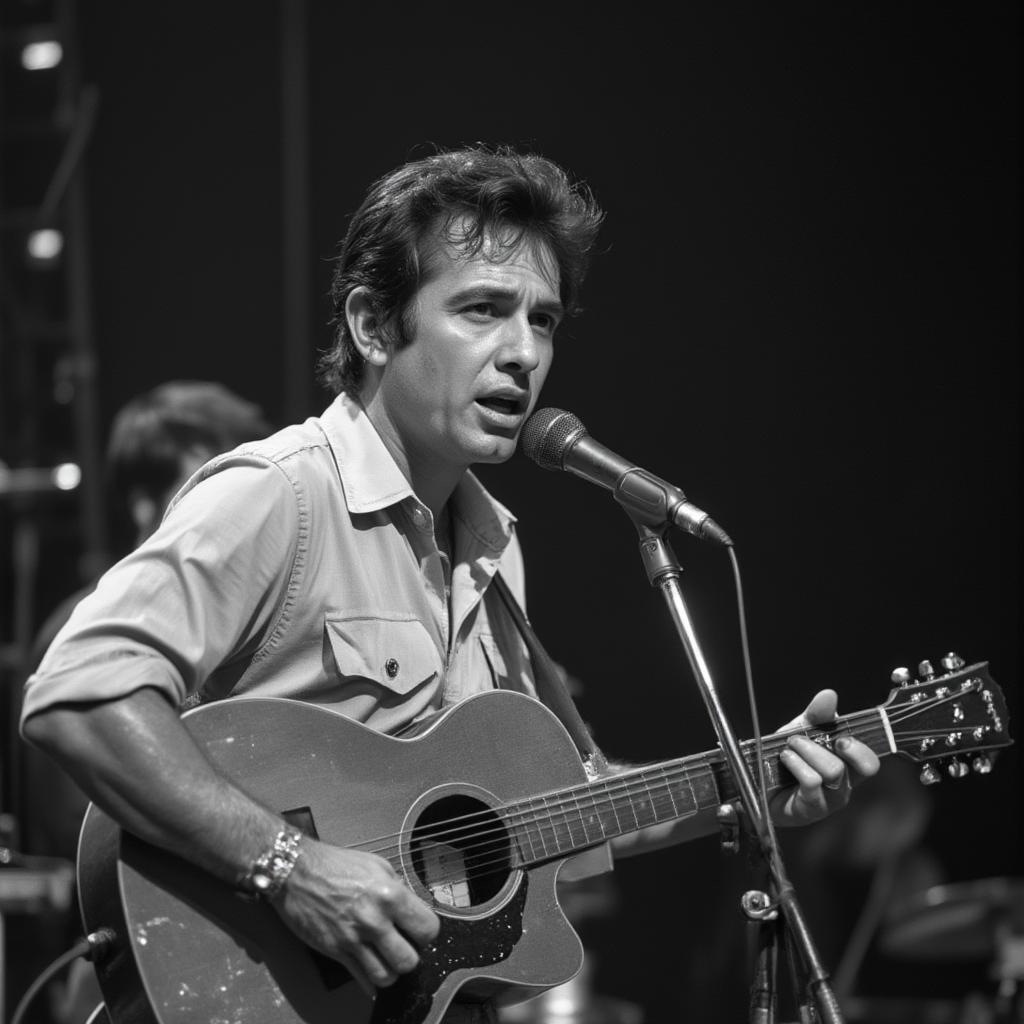Unearthing the Legend of Johnny Cash: More Than Just the Man in Black

The Legend Of Johnny Cash is far more profound than the iconic image of the Man in Black. He was a complex artist, a flawed human, and a voice for the downtrodden. His music transcended genres, his life was a rollercoaster, and his impact on American culture is undeniable. Let’s delve into the story of Johnny Cash, exploring the facets that cemented his place as a true icon.
The Early Years: Roots of a Legend
Born J.R. Cash in Kingsland, Arkansas, his early life was steeped in the hardships of the Great Depression. Growing up on a cotton farm instilled a work ethic and a deep understanding of rural life that permeated his music. The loss of his brother Jack in a tragic accident also deeply impacted him, shaping his views on life and death, themes that would frequently appear in his work. Cash’s early exposure to gospel music in church and the work songs he heard in the fields would later fuel his distinctive vocal style and his approach to storytelling in song. He was learning the fundamentals without even realizing it. These influences are vital to understanding the man who would become the legend of Johnny Cash.

The Rise of a Star
After a stint in the Air Force, Cash found himself in Memphis, the cradle of rock and roll. He auditioned for Sam Phillips at Sun Records, and while initially rejected for his gospel-tinged sound, his determination paid off. The release of “Cry! Cry! Cry!” in 1955 marked the beginning of his career, but it was “I Walk the Line” that propelled him into stardom. This was more than just music; this was Johnny Cash forging his own path. This unique sound quickly became a trademark. His signature “boom-chicka-boom” rhythm and his baritone voice resonated with audiences.
The Man in Black: A Symbol of Rebellion
Johnny Cash’s choice of attire—black from head to toe—wasn’t just a fashion statement. It became a symbol of his solidarity with the less fortunate, the incarcerated, and the marginalized. He famously said, “I wear black for the poor and the beaten down, livin’ in the hopeless, hungry side of town.” This identification with those struggling cemented his status as a rebel. He was a voice for the voiceless. His tours to prisons weren’t just performances; they were a deeply meaningful connection with an often-forgotten community. He didn’t just sing to them; he sang with them.
Beyond the Image
While the “Man in Black” persona was powerful, it’s vital to remember that this wasn’t his entire story. He grappled with substance abuse, and his personal life was often tumultuous. His struggles with addiction and infidelity were well-documented. Yet, these very challenges became another aspect of the honesty and vulnerability he brought to his music. He was never afraid to show his flaws, which made his art even more resonant. This is the complex heart of cash johnny ring of fire.
“Johnny Cash’s willingness to confront his own demons in his music made him so relatable,” says Dr. Eleanor Vance, a music historian specializing in 20th-century American folk music. “He wasn’t afraid to be vulnerable, and that’s what connected him to his audience on such a deep level.”
Folsom Prison Blues: A Turning Point
The release of “At Folsom Prison” in 1968 is a monumental moment in Cash’s career. The live recording, featuring the song Folsom Prison Blues, captured the raw energy of his connection with his audience. It showcased his ability to empathize with those on the fringes of society, making him a symbol of hope for those who felt forgotten. This album wasn’t just commercially successful, it was a cultural phenomenon. It redefined what a country artist could be and brought his music to a wider audience. The raw emotion and honesty in that performance are what makes the folsom prison guitar so iconic.
The Impact of June Carter
June Carter Cash was not only a love of his life, but also a partner in music and life. Their collaboration was a cornerstone of his career, both creatively and personally. Their songs together, often highlighting their deep connection, are among some of his most beloved. Her impact went far beyond the stage; she supported him through his struggles, acting as a constant, unwavering support. Together, they formed one of music’s most enduring partnerships. The story of their relationship is as captivating as the legend of Johnny Cash.
The Later Years: A Resurgence
While the 1980s and early 90s were a less prolific period for him, Johnny Cash experienced a remarkable resurgence in the latter part of his career. His collaboration with producer Rick Rubin on the American Recordings series brought him back to the forefront of popular music. He returned to his roots, focusing on raw and stripped-down arrangements, breathing new life into his classic songs while also introducing his music to a new generation. This was Johnny Cash embracing his legacy and reinventing himself once more.
Legacy and Influence
Johnny Cash’s impact on music is undeniable. He transcended genres, influencing artists from country to rock to punk. His authenticity, his unwavering commitment to his vision, and his deep connection with his audience continue to inspire artists today. He left behind a legacy that goes beyond just music; it’s about the power of honesty, the importance of empathy, and the enduring strength of the human spirit. The influence of daniel thompson johnny cash on the art of guitar playing is an example of his lasting impact on music.
“Cash’s music wasn’t about perfection; it was about raw honesty,” notes Martin Hayes, a Grammy Award-winning music producer. “That raw energy and the stories he told – they’re timeless. He taught us that it’s okay to be flawed.”

Keeping the Flame Alive
Through his music, the spirit of Johnny Cash lives on. His stories, his voice, and his unique perspective continue to resonate with listeners of all ages and backgrounds. His music is not just entertainment, it’s a glimpse into the soul of a man who lived a life that was both deeply personal and universally relatable. We continue to explore the ghost of johnny cash david radcliffe so that his story never fades. We remember the man who, even in his flaws, taught us what it meant to be human. The legend lives on.
Conclusion: The Enduring Impact of the Man in Black
Johnny Cash was more than just a musician; he was an American icon. His journey from the cotton fields of Arkansas to the stages of the world is a story of resilience, authenticity, and a relentless commitment to his art. His music continues to touch hearts and minds, solidifying his place as an enduring legend. He was a voice for the voiceless, a rebel with a cause, and an artist who wasn’t afraid to be himself. The legend of Johnny Cash will continue to inspire for generations to come.
Frequently Asked Questions about Johnny Cash
What was Johnny Cash known for?
Johnny Cash was primarily known for his distinctive baritone voice, his “boom-chicka-boom” rhythm, his storytelling lyrics, and his persona as the “Man in Black.” He was also celebrated for his prison concerts and advocacy for the marginalized.
When did Johnny Cash start his music career?
Johnny Cash started his professional music career in 1955 when he signed with Sun Records. His first hit was “Cry! Cry! Cry!” followed by “I Walk the Line,” which became one of his signature songs.
What is Johnny Cash’s best-selling album?
While he had many successful albums, “At Folsom Prison” is often considered one of his most iconic, and it was also one of his best-selling albums, capturing a significant moment in his career.
What inspired Johnny Cash’s music?
Cash’s music was heavily influenced by his rural upbringing in Arkansas, the hardships he experienced during the Great Depression, his personal struggles, his gospel roots, and his compassion for the downtrodden.
Why did Johnny Cash wear black?
Johnny Cash wore black as a symbol of solidarity with the poor, the imprisoned, and the marginalized. He explained that he wore black for those who had no voice and felt hopeless.
How did June Carter influence Johnny Cash?
June Carter Cash was a major influence on Johnny Cash’s life and career. She was not only his wife but also his creative partner and a source of emotional support. Their collaborations are among some of his most beloved songs.
What was the impact of Rick Rubin on Johnny Cash’s career?
Rick Rubin revitalized Johnny Cash’s career with the “American Recordings” series. He helped Cash strip down his sound and focus on raw, emotive performances, introducing him to a new audience.
What is Johnny Cash’s lasting legacy?
Johnny Cash’s lasting legacy includes his contribution to American music, his ability to connect with audiences through his authenticity, his willingness to confront his own flaws, and his empathy for the marginalized. He is considered one of the most important and influential figures in American music.




